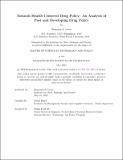Towards Health Centered Drug Policy: An Analysis of Past and Developing Drug Policy
Author(s)
Lewis, Benjamin B.
DownloadThesis PDF (1.536Mb)
Advisor
Rand, David
Terms of use
Metadata
Show full item recordAbstract
Drug criminalization has disproportionately impacted communities of color and has insufficiently addressed substance use disorder and its associated risk of death through overdosing. Decriminalization has the potential to restore justice to communities decimated by traditional U.S. drug policy and could shift public focus towards medical approaches to treating addiction, however, inertia in drug policy persists, influenced by America’s popular political beliefs about illicit substances. A long-standing narrative in the United States views marijuana as a “gateway drug” that introduces users to harder substances, which then have adverse effects on their health and livelihood. As a result, many argue that policies which decriminalize marijuana are exacerbating the problem of drug addiction. Seemingly in line with this argument, overdose-related deaths–largely driven by increases in opioid consumption–have soared in recent years, and at the same time an increasing number of states have decriminalized marijuana. Little work, however, has examined the extent to which marijuana legalization has caused an increase in overdose deaths. Here, we address this question. To examine the causal effect of marijuana legalization on overdose deaths, we combine state-year level data on marijuana policy and overdose deaths with state-of-the-art techniques from the field of causal inference, namely Two-Way Fixed Effect Difference-in-Differences analysis with Synthetic Control. We include data from all states that enacted one of five marijuana legalization policies between 2010 and 2020. We estimate the causal effect of each policy separately for each state, and then use meta-analysis to calculate the overall effect of each policy intervention. We find that the passage of medical marijuana legalization laws, the opening of recreational dispensaries, and the implementation of Medical marijuana patient ID programs had no significant effect on annual state overdose death rates. The opening of medical marijuana dispensaries and the passage of recreational marijuana legalization laws also had no significant overall effect on overdose death rates, but the effect of these policies varied significantly across states such that there were significant increases in some states and significant decreases in others. Overall, these findings contradict the popular claim that marijuana decriminalization leads to increased use of more dangerous drugs (and thus overdose deaths) in most cases – and more generally questions the characterization of marijuana as a gateway drug.
Date issued
2024-05Department
Massachusetts Institute of Technology. Institute for Data, Systems, and Society; Technology and Policy ProgramPublisher
Massachusetts Institute of Technology